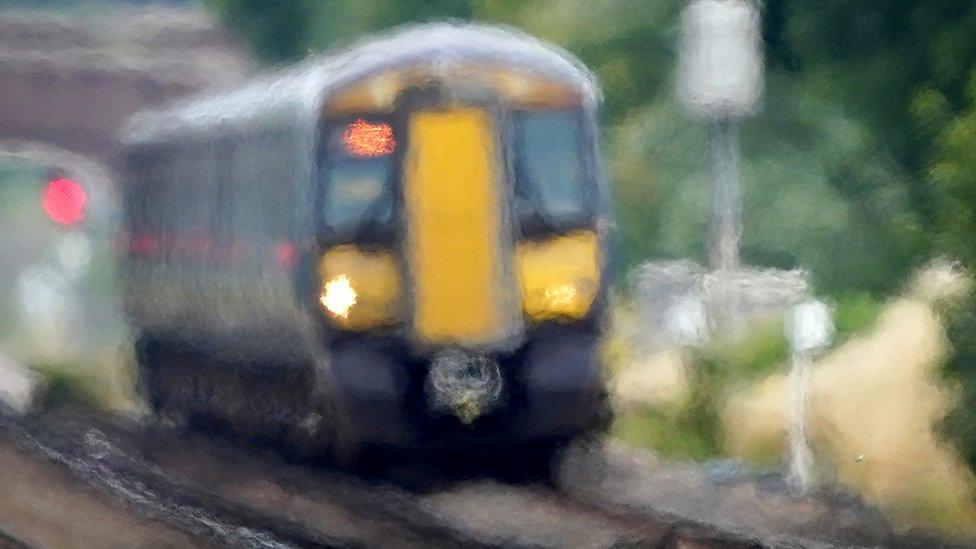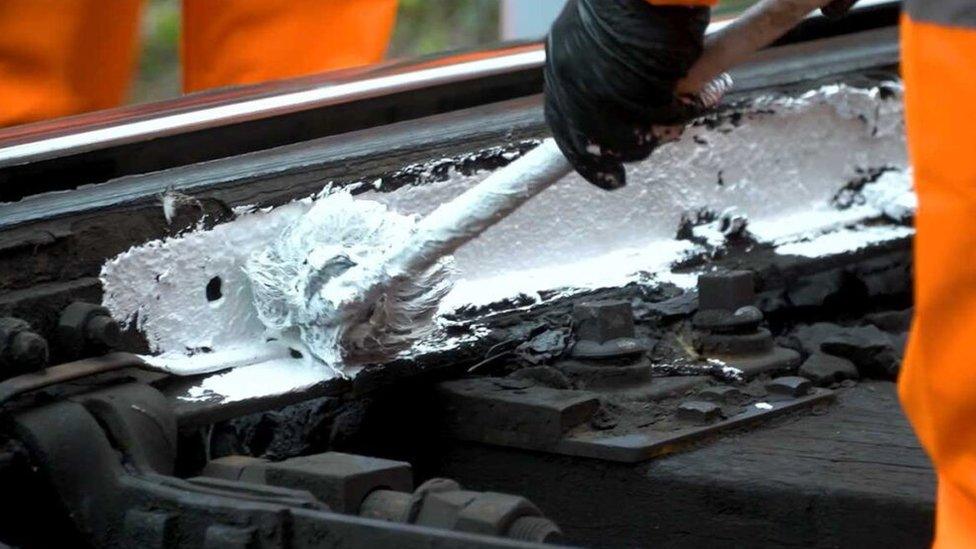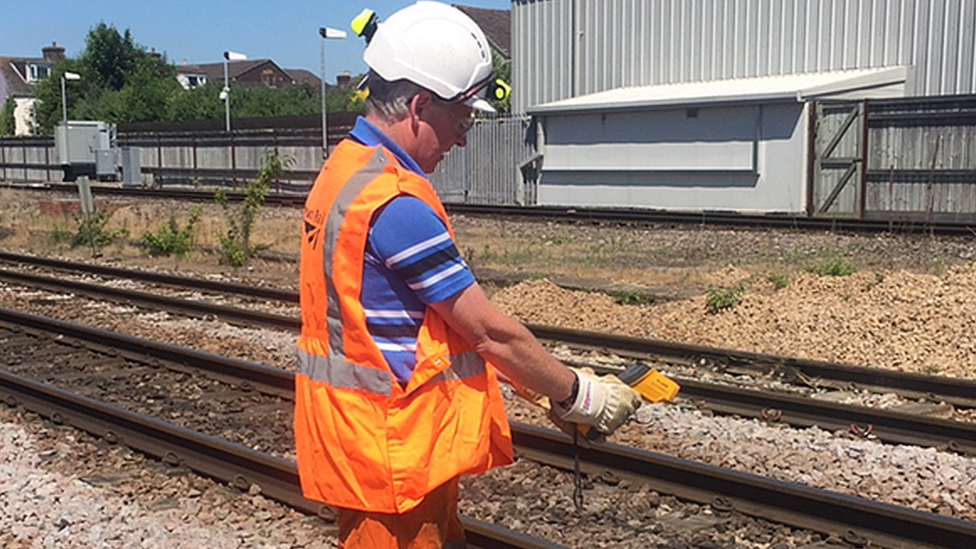Train speeds limited over track buckling heatwave fears
- Published
- comments

Railway speed restrictions have been brought in across most of England and Wales as record temperatures could affect the safety of steel tracks.
Trains will mostly be limited to speeds of 90mph, down from 100mph or 125mph, while some will go as slow as 20mph.
The Met Office has issued a red extreme heat warning in England, with amber warnings in Scotland and Wales.
When steel gets very hot it expands and tracks can bend, flex and, in serious cases, buckle, Network Rail said.
It advised only essential travel and warned journeys would take significantly longer than usual with more chance of cancellations.
Those who do travel are advised to wear cool clothes, take handheld fans and ensure they have plenty of water, it said.
Many train companies will be running reduced timetables and passengers are being advised to check before they depart. The RAC motoring group has also warned some roads could melt as a result of the heat.
Network Rail said passenger numbers were down by about 20% across Britain's 20 biggest and busiest stations on Monday morning compared to the same time last week.
Speed limits for trains are brought in when temperatures soar as steel railways absorb heat easily and tend to be around 20C (68F) above the surrounding air temperature.
The restrictions help because a train exerts less force when it's going more slowly, meaning the rail is less likely to buckle in the heat.
Overhead power lines - especially less modern ones - can also expand and sag in hot weather, and so travelling slower reduces the risk of damage.
'Exceptional stress'
Jake Kelly, who is leading the management of disruption for Network Rail, told BBC Radio 4's Today programme the railways would be placed under "exceptional stress" due to the heat.
Mr Kelly said the rail operator hadn't taken its decision to reduce services lightly, but added "we have not been faced with these exceptional temperatures before".
"Our advice very strongly to customers in England and Wales today and tomorrow is to only travel if absolutely essential," he said.
Mr Kelly said he hoped usual service would resume on Wednesday.

Painting rails white helps them withstand higher temperatures
A kink in the track brought on by the heat near Vauxhall in London caused disruption on Monday, Network Rail said., external
Network Rail Scotland tweeted, external about a fault on the electrical overhead lines between Glasgow Queen St Low Level and Hyndland "caused by the extreme heat".
Services on the West Coast Mainline will be limited to 90mph, with operator Avanti West Coast warning there would be "far fewer" journeys on Monday and Tuesday.
"Customers with advance tickets for travel on Monday 18 and Tuesday 19 [July] who choose not to travel are entitled to a full refund via their point of purchase," the company said., external
"Alternatively, tickets will be valid for travel up to Wednesday 20 July."
Network Rail has said no services will run north from Kings Cross at all on Tuesday. LNER, Great Northern, Hull Trains and Lumo are all operators who usually use that route.
The suspension is because the line is more susceptible to high temperatures than others, for reasons including the design of the overhead electric wire supports.
East Midlands Railway slashed its timetable for London, where temperatures are expected to peak, running only one train per hour - compared to the normal two - between the capital and Sheffield, Nottingham and Corby.
The TransPennine Express, which runs between the north of England and Scotland, said that journeys would "take longer than usual" and warned of further disruption.
'Hot spots'
In other areas, which includes journeys out of King's Cross station in London, trains will be limited to 60mph between 12:00 and 20:00 BST on Monday, meaning a normal two-hour journey will take more than four hours.
In a bid to try and stop tracks getting too hot, Network Rail paints "hot spot" sections of track white so they absorb less heat.
Network Rail's extreme weather action teams, or "EWATs", will be based at key hotspots, monitoring trackside temperatures and responding to any potential issues caused by the heat.
Mr Kelly said Network Rail was spending "hundreds of millions of pounds a year on making the railway more resilient but ultimately faced with weather like we have never faced before the infrastructure will suffer".
He also said one reason services had been reduced was due to modern carriages having no windows which can be opened.
Melting
Separately, the RAC has warned that high temperatures are expected to lead to a "huge increase" in vehicle breakdowns, with "potentially over 1,000 more a day than is normal for mid-July".
Checking oil and coolant are at the right levels and tyres are free of damage, have plenty of tread and are inflated to the right pressures, has been advised.
The group also said melting roads are "likely" because of the hot weather, with blacker patches being "the most obvious sign".
"Drivers therefore shouldn't be surprised to see some gritting trucks out, as spreading a fine granite dust can help improve vehicle grip on softening road surfaces," said RAC breakdown spokesman Rod Dennis.
"Drivers also shouldn't be alarmed if they see water underneath their vehicles, which is normally just condensation coming from the air conditioning unit."
The high temperatures have also caused a "surface defect" on the runway which has led to the suspension of flights at London Luton Airport.
A statement from the airport said: "Engineers were called immediately to site and repair works are currently in progress to resume operations as soon as possible.
"We would like to apologise for the inconvenience caused."
Related topics
- Published15 July 2022

- Published18 July 2022
